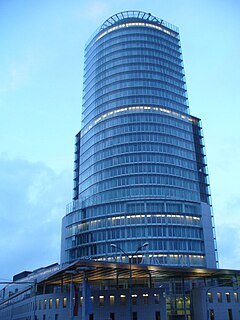The Economy of Kenya is a market-based economy with a few state enterprises, it is also an emerging market and an averagely industrialised nation ahead of its East African peers. Kenya is a middle income nation and plans to be a newly industrialised nation in 2030. Major industries include agriculture, forestry, fishing, mining, manufacturing, energy, tourism and financial services. As of 2020, Kenya had the third largest economy in Sub-Saharan Africa, coming behind Nigeria and South Africa.

The economy of Slovakia is based upon Slovakia becoming an EU member state in 2004, and adopting the euro at the beginning of 2009. Its capital, Bratislava, is the largest financial centre in Slovakia. As of Q1 2018, the unemployment rate was 5.72%.

The economy of Bahrain is heavily dependent upon oil and gas. The Bahraini Dinar is the second-highest-valued currency unit in the world. Since the late 20th century, Bahrain has heavily invested in the banking and tourism sectors. The country's capital, Manama is home to many large financial structures. Bahrain's finance industry is very successful. In 2008, Bahrain was named the world's fastest growing financial center by the City of London's Global Financial Centres Index. Bahrain's banking and financial services sector, particularly Islamic banking, have benefited from the regional boom driven by demand for oil. Petroleum is Bahrain's most exported product, accounting for 60% of export receipts, 70% of government revenues, and 11% of GDP. Aluminium is the second most exported product, followed by finance and construction materials.

In economics and political science, fiscal policy is the use of government revenue collection and expenditure to influence a country's economy. The use of government revenue expenditures to influence macroeconomic variables developed in reaction to the Great Depression of the 1930s, when the previous laissez-faire approach to economic management became unworkable. Fiscal policy is based on the theories of the British economist John Maynard Keynes, whose Keynesian economics theorised that government changes in the levels of taxation and government spending influence aggregate demand and the level of economic activity. Fiscal and monetary policy are the key strategies used by a country's government and central bank to advance its economic objectives. The combination of these policies enables these authorities to target inflation and to increase employment. Additionally, it is designed to try to keep GDP growth at 2%–3% and the unemployment rate near the natural unemployment rate of 4%–5%. This implies that fiscal policy is used to stabilise the economy over the course of the business cycle.

The Four Asian Tigers are the developed East Asian economies of Hong Kong, Singapore, South Korea, and Taiwan. Between the early 1960s and 1990s, they underwent rapid industrialization and maintained exceptionally high growth rates of more than 7 percent a year.

The expression military–industrial complex (MIC) describes the relationship between a country's military and the defense industry that supplies it, seen together as a vested interest which influences public policy. A driving factor behind the relationship between the military and the defense-minded corporations is that both sides benefit—one side from obtaining war weapons, and the other from being paid to supply them. The term is most often used in reference to the system behind the armed forces of the United States, where the relationship is most prevalent due to close links among defense contractors, the Pentagon, and politicians. The expression gained popularity after a warning of the relationship's detrimental effects, in the farewell address of President Dwight D. Eisenhower on January 17, 1961.

Within the budgetary process, deficit spending is the amount by which spending exceeds revenue over a particular period of time, also called simply deficit, or budget deficit; the opposite of budget surplus. The term may be applied to the budget of a government, private company, or individual. Government deficit spending was first identified as a necessary economic tool by John Maynard Keynes in the wake of the Great Depression. It is a central point of controversy in economics, as discussed below.
Economic forecasting is the process of making predictions about the economy. Forecasts can be carried out at a high level of aggregation—for example for GDP, inflation, unemployment or the fiscal deficit—or at a more disaggregated level, for specific sectors of the economy or even specific firms. Economic forecasting is a measure to find out the future prosperity of a pattern of investment and is the key activity in economic analysis. Many institutions engage in economic forecasting: national governments, banks and central banks, consultants and private sector entities such as think-tanks, companies and international organizations such as the International Monetary Fund, World Bank and the OECD. A broad range of forecasts are collected and compiled by "Consensus Economics". Some forecasts are produced annually, but many are updated more frequently.
This article concerns proposals to change the Social Security system in the United States. Social Security is a social insurance program officially called "Old-age, Survivors, and Disability Insurance" (OASDI), in reference to its three components. It is primarily funded through a dedicated payroll tax. During 2015, total benefits of $897 billion were paid out versus $920 billion in income, a $23 billion annual surplus. Excluding interest of $93 billion, the program had a cash deficit of $70 billion. Social Security represents approximately 40% of the income of the elderly, with 53% of married couples and 74% of unmarried persons receiving 50% or more of their income from the program. An estimated 169 million people paid into the program and 60 million received benefits in 2015, roughly 2.82 workers per beneficiary. Reform proposals continue to circulate with some urgency, due to a long-term funding challenge faced by the program as the ratio of workers to beneficiaries falls, driven by the aging of the baby-boom generation, expected continuing low birth rate, and increasing life expectancy. Program payouts began exceeding cash program revenues in 2011; this shortfall is expected to continue indefinitely under current law.

Christopher David Naylor, is a Canadian physician, medical researcher and former president of the University of Toronto. He is ICES scientist emeritus and founding CEO. In 2016, he was inducted into the Canadian Medical Hall of Fame.

Sitra, the Finnish Innovation Fund, is an independent public foundation which operates directly under the supervision of the Finnish Parliament. Its endowment was valued at 771 million euros in 2017. Its duties are stated in legislation: the objective of the foundation is "to promote stable and balanced development in Finland, qualitative and quantitative economic growth and international competitiveness and cooperation", by means of supporting "projects that increase the efficiency of the economy, improve the level of education or research, or study future development scenarios". Sitra functions both as a think tank and as an investment company. Sitra was founded in 1967 as a part of the Bank of Finland, on the country's 50th anniversary. However, most of the value of its current endowment comes from a donation of Nokia stock from the Finnish Parliament in 1992.

The Ministry of Education is a ministry of the Government of Singapore responsible for the formulation and implementation of policies related to the education in Singapore.
The Governance and Economic Management Assistance Program (GEMAP) is an effort, started September 2005, by the Liberian government and the international community, via the International Contact Group on Liberia (ICGL) to reshape the fundamentally broken system of governance that contributed to 23 years of conflict in Liberia.
The Future Fund is an independently managed sovereign wealth fund established in 2006 to strengthen the Australian Government's long-term financial position by making provision for unfunded superannuation liabilities for politicians and other public servants that will become payable during a period when an ageing population is likely to place significant pressure on the Commonwealth's finances. In 2021 the fund had US$143.7 billion in assets under management.
Barack Obama, the 44th President of the United States, has declared his position on many political issues through his public comments and legislative records. The Obama Administration stated that its general agenda was to "revive the economy, provide affordable and accessible health care to all, strengthen our public education and social security systems, define a clear path to energy independence and tackle climate change, end the War in Iraq responsibly and finish our mission in Afghanistan, and work with our allies to prevent Iran from developing a nuclear weapon."

Edwin Walter Kemmerer was an American economist, who became famous as an economic adviser to foreign governments in many countries, promoting plans based on strong currencies, the gold standard, central banks, central bank independence, and balanced budgets. He helped design the U.S. Federal Reserve System in 1911, edited the American Economic Bulletin and the American Economic Review, and became president of the American Economic Association in 1926.

The Great Depression was a severe worldwide economic depression between 1929 and 1939 that began after a major fall in stock prices in the United States. The economic contagion began around September 4, 1929, and became known worldwide on Black Tuesday, the stock market crash of October 29, 1929. The economic shock transmitted across the world, impacting countries to varying degrees, with most countries experiencing the Great Depression from 1929. The Great Depression was the longest, deepest, and most widespread depression of the 20th century and is regularly used as an example of an intense global economic depression.

The carbon bubble is a hypothesized bubble in the valuation of companies dependent on fossil-fuel-based energy production, resulting from future decreases in value of fossil fuel reserves as they become unusable in order to meet carbon budgets and recognition of negative externalities of carbon fuels which are not yet taken into account in a company's stock market valuation.

Budget 2019, dubbed the Wellbeing Budget, was the name given to the New Zealand budget for fiscal year 2019/20 presented to the New Zealand House of Representatives by Finance Minister Grant Robertson on 30 May 2019. This was the second budget presented by the Coalition Government. Its release was complicated by the accidental publication of budgetary documents on a test website two days prior to its official release on 30 May, attracting significant media and public attention.

Next Generation EU is a European Union (EU) economic recovery package to support the EU member states to recover from the COVID-19 pandemic, in particular those that have been particularly hard hit. Agreed in principle by the European Council on 21 July 2020 and adopted on 14 December 2020, the instrument is worth €750 billion. NGEU will operate from 2021 to 2026, and will be tied to the regular 2021–2027 budget of the EU's Multiannual Financial Framework (MFF). The comprehensive NGEU and MFF packages are projected to reach €1824.3 billion.













